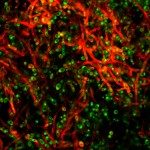Lien vers Pubmed [PMID] – 27572834
Nat Microbiol 2016 Apr;1(6):16043
Plant infections caused by fungi are often associated with an increase in the pH of the surrounding host tissue(1). Extracellular alkalinization is thought to contribute to fungal pathogenesis, but the underlying mechanisms are poorly understood. Here, we show that the root-infecting fungus Fusarium oxysporum uses a functional homologue of the plant regulatory peptide RALF (rapid alkalinization factor)(2,3) to induce alkalinization and cause disease in plants. An upshift in extracellular pH promotes infectious growth of Fusarium by stimulating phosphorylation of a conserved mitogen-activated protein kinase essential for pathogenicity(4,5). Fungal mutants lacking a functional Fusarium (F)-RALF peptide failed to induce host alkalinization and showed markedly reduced virulence in tomato plants, while eliciting a strong host immune response. Arabidopsis plants lacking the receptor-like kinase FERONIA, which mediates the RALF-triggered alkalinization response(6), displayed enhanced resistance against Fusarium. RALF homologues are found across a number of phylogenetically distant groups of fungi, many of which infect plants. We propose that fungal pathogens use functional homologues of alkalinizing peptides found in their host plants to increase their infectious potential and suppress host immunity.

